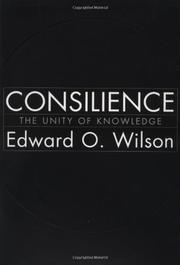

CONSILIENCE
The Unity of Knowledge
by Edward O. Wilson
A tour de force from a scholar for whom such tours are par for the course. Wilson, who sowed the seeds of sociobiology decades ago, expands his agenda to the whole of human learning and behavior. All, in both the realms of art and science, can be reduced to a common set of unifying principles, or consilience. All can be subsumed under the basic laws of physics and their offspring in chemistry and biology. For instance, the reductionist new genetics and molecular biology have revolutionized our understanding of biology in terms of evolution, human development, and the brain as the vehicle of human behavior. Further, Wilson restates his notion of the co-evolution of genes and culture, but it is here that his argument is weakest, based on the premise that we are genetically programmed toward certain archetypal forms and themes which he finds in primitive and ancient art but which are dubiously applicable in the modern world. Wilsons arguments on achieving consilience in the h umanities will no doubt rile many of the faithful in these fields. For example, he rails against economists for their arid mathematical models that pay no heed to the irrational ways humans behave and he pretty well damns anyone who espouses cultural relativism; and he has very little good to say about philosophers in general. On the other hand, he writes knowledgeably about mind, making it clear that emotion is inextricably tied to reason, and his distinction between religion and ethics is well argued. In the end, Wilson invites scholars to explore the gaps in knowledge, as well as move toward synthesis: We are drowning in information, he says, while starving for wisdom. :He also pulls out all the stops on the future of the biosphere, noting the potential for changing our genet ic make- up. No doubt many scholars will accuse Wilson of simplistic arguments, errors, and distortions. But how many have the guts to venture beyond the boundaries of their specialty to make a case for unity? For that reason alone, Wilsons proposal merits the attention and debate of the broad community of scholars. (First printing of 125,000)